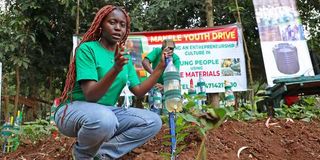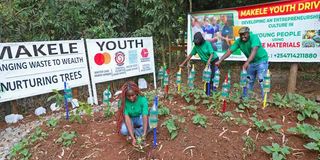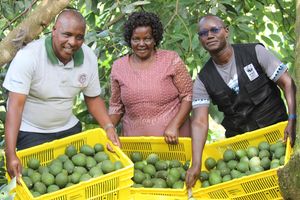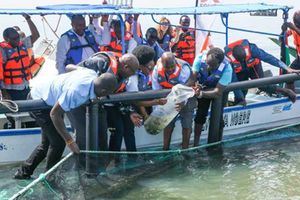
Makele Youth Drive founder Makele Patricia using waste materials to nurture trees at Jamhuri Park Show Grounds, Nairobi on September 26, 2024.
After enjoying a bottle of beverage, what do you do with the container? Most people discard them on roads or parks.
For Patricia Makele, however, plastic bottles are gold. The environmental science student converts plastic waste into an agricultural commodity, supporting climate-smart agriculture.
Using plastic bottles, Makele assembles a tree drip system. Apart from the bottle, the system has a piece of wood and soda straw.
“We make a small hole at the bottom of the bottle, insert a straw for taking water to the plant in the ground and seal any possible leaks,” the third-year student says, adding that the bottle is supported by wood sourced from discarded pieces of furniture.
The idea was born a few years ago. Soon after, she established Makele Youth Drive.
The tree drip system is effective in conserving water.
“We design it to release a drop of water every minute. It can sustain plants during drought for a week,” says the Chief Executive of the registered NGO. The organisation also works with young people in Nairobi’s slums, rehabilitating drug addicts.
The system is approved by the National Environment Management Authority for farming.

Makele Youth Drive members use waste materials to nurture trees at Jamhuri Park, Nairobi.
Makele has taken the technology to more than 15 schools in Nairobi, Machakos and Kajiado counties.
“We have introduced the innovation to learning institutions in order to support 4-K Clubs and inclusivity by involving students with disabilities in tree-planting campaigns,” she says.
The 4-K Clubs, revived by then-president Uhuru Kenyatta in 2021, aim to inculcate crop and animal production knowledge and skills in young Kenyans.
“We teach school children the value of agriculture and the environment. It helps them understand the importance of conserving the ecosystem,” Makele tells Seeds of Gold.
Makele says the system has had a 70 per cent adoption rate in the schools she has worked with.
“Students appreciate it. Some say they have never had a chance to plant and nurture a tree to maturity. Schools are happy with the system for it helps them grow food and conserve water,” she says.
Makele adds that the drive by the government to plant 15 billion trees by 2032 can be realised through climate-smart farming.
Makele began pursuing this idea while still in Form Two at Precious Blood High School, Riruta, in 2018.
“Some students faced many challenges at home and school. I used my love for art and craft to make a flower from waste materials and gifted it to a girl in distress,” she says.
“The principal learnt about it and supported my cause.”
The NGO works with 18 to 35-year-olds, encouraging innovation and using their skills and talents to promote farming.
The Makele Youth Development Drive hub directly engages 30 young people and has indirectly reached at least 400 conservation champions.
“It has taught us to appreciate and conserve the ecosystem,” says Ann Wanjiku, a member who is pursuing a degree in journalism.
“Initially, we thought farming was all about jembes, pangas, chickens, cows and goats. This technology has made growing crops interesting.”
Wanjiku grows strawberries at her parents’ kitchen garden in the capital city.
Assembling a localised tree drip system costs around Sh150. It is then sold for Sh250.
“We provide a tree seedling for every purchase of the system,” Makele says.
Supported by the devolved government, Makele Youth Drive was among the participants in last year’s Nairobi International Trade Fair organised by the Agricultural Society of Kenya.
Themed “Promoting Climate-Smart Agriculture and Trade Initiatives for Sustainable Economic Growth”, the event showcased many climate-smart solutions.
Makele has faced funding challenges but is determined to complete her conservation journey. The goal is to reach millions of people in Kenya and the region.







